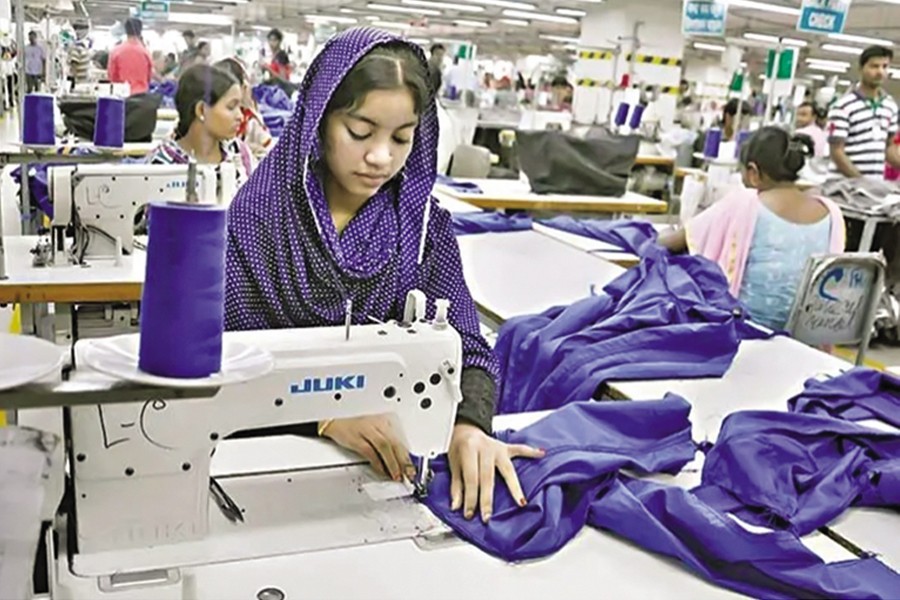
Published :
Updated :

The export performance of the readymade garment (RMG) sector, the country's largest foreign currency earner, has been severely affected by multiple factors, including new US tariffs, a sluggish global economy, and local challenges in securing complex, small-sized orders, industry insiders say.
They also point to political uncertainty and election-related concerns as contributing factors that have shaken buyers' confidence.
Bangladesh has witnessed a decline in export earnings from RMG shipments for three consecutive months-August, September and October 2025 -- compared to the same months in 2024.
Data from the Export Promotion Bureau (EPB) shows a negative growth of 4.75 per cent in August, 5.66 per cent in September, and 8.39 per cent in October 2025.
In monetary terms, the export earnings stood at US$3.01 billion in October, US$2.83 billion in September, and US$3.16 billion in August 2025.
This marks a significant decline from the corresponding months of 2024, when exports earned US$3.29 billion in October, US$3.01 billion in September, and US$3.32 billion in August.
The downturn came after a period of robust growth in July 2025 when the fiscal year began with a growth of 24.67 per cent in exports.
This surge was largely driven by early shipments to avoid the imposition of an additional 20 per cent US tariff on Bangladeshi-made garments, which had been announced for the following months, industry insiders said.
The country earned a total of US$12.99 billion from garment shipments during the July-October period of current fiscal year.
In the last fiscal year of 2024-25, RMG exports stood at US$39.34 billion that included US$ 21.15 billion from knitted items and US$18.18 billion from woven garments.
Local challenges and political uncertainty
Bangladesh Garment Manufacturers and Exporters Association (BGMEA) president Mahmud Hasan Khan said July exports growth was strong as buyers received shipments as much as they can to avoid additional cost of new US tariff and that affected August performance.
September was a lean period and the negative growth is 'concerning', he added.
Buyers' costs have increased due to the additional US tariffs, while local exporters are facing tough competition in shipping to the European Union, as China has aggressively entered the 27-nation bloc with lower prices, he said.
The BGMEA chief also mentioned that a significant number of factories have recently closed for various reasons, which could negatively impact overall garment exports.
He added that approximately 220 BGMEA-listed factories and 40 to 50 BKMEA-listed factories were shut down in 2024 and 2025, including some that were closed due to political reasons.
Shovon Islam, managing director of Sparrow Group, explained that Bangladesh's garment and fabric makers have to bear about 5 per cent of the 20 per cent US tariff, while buyers themselves absorb the rest 15 per cent tariff-induced cost.
As a result, many buyers have scaled back their orders, reluctant to raise retail prices in response to the added costs, he said.
Besides, he believes that Bangladesh has already received the work orders shifted from China, while those still shifting are going to other countries, as Bangladesh lacks the capability to secure small-sized orders involving complex fabrics and MMF-based products.
These challenges are due to inefficient port handling, complex customs procedures, and long lead times, as Bangladesh requires at least 16 weeks to import fabrics and ship goods after production, he said.
He added that the lack of a backward linkage industry for MMF-based garments further exacerbates the issue.
He also attributed the current political uncertainty and security concerns to the hesitation among buyers to place large-volume work orders, opting instead for a "wait and watch" approach.
Furthermore, he noted that three of his buyers, who arrived in Dhaka from London on Thursday morning, declined scheduled factory visits due to security concerns.
Security concerns and factory issues
Fazlul Hoque, former president of the Bangladesh Knitwear Manufacturers and Exporters Association (BKMEA), said that many buyers, particularly those with offices in Bangladesh, are on heightened alert due to the current situation.
Exporters continue to face difficulties in opening letters of credit as banks have become more cautious following some previous incidents, he said.
Hoque, also the managing director of Plummy Fashions Ltd, mentioned that incidents of vandalism in factories, often linked to wage disputes, have further undermined buyer confidence.
In addition, the global economy remains sluggish, and the US tariff hike has dampened demand, particularly from the European Union, which has led to a decline in work orders from that market.
Hoque expressed concern about whether Bangladesh is receiving the available work orders or if they are being diverted to other countries.
Outlook and future prospects
BGMEA president Mahmud Hasan Khan stressed the need to improve internal efficiency, particularly at ports, to boost local exporters' competitiveness, reduce production costs, and explore new markets to offset the challenges in traditional markets.
Despite these efforts, industry leaders believe that the trend of negative growth may continue for the next several months.
Shovon Islam predicted that Bangladesh could lose up to 10 per cent of its work orders for the upcoming summer season.
According to data from Mapped in Bangladesh (MiB), there are currently 3,320 factories in operation, with 1,766 registered with BGMEA and 454 with BKMEA while an additional 284 factories are registered with both trade bodies.
Munni_fe@yahoo.com


 For all latest news, follow The Financial Express Google News channel.
For all latest news, follow The Financial Express Google News channel.